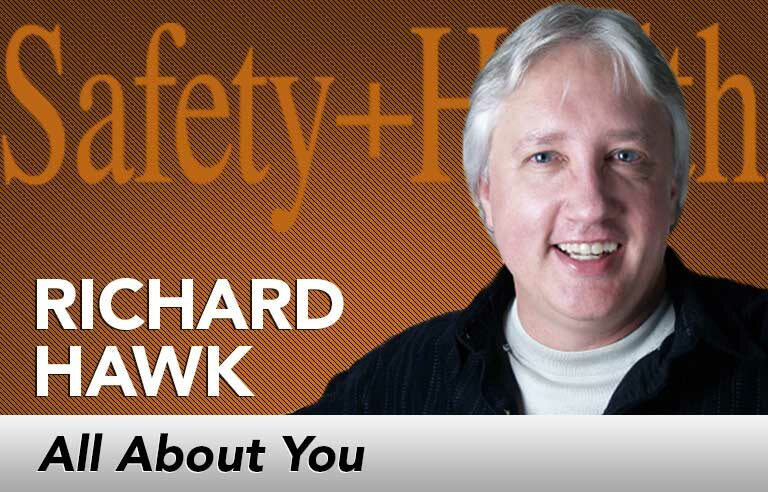All About You: Dealing with professional jealousy and envy

EDITOR’S NOTE: Motivating employees to work safely is part of the safety professional’s job. But who motivates the motivator? In this monthly column, veteran safety pro and professional speaker Richard Hawk offers his entertaining brand of wisdom to inspire safety pros to perform at their best.
Once upon a time, there was a seasoned safety professional named John. He enjoyed his job and found it satisfying. Every morning when John woke up, he looked forward to going to work because he knew he was making a positive difference at the site where he’d been a safety supervisor for 17 years.
One day, a new safety supervisor with only three years of safety experience was hired to work in John’s department. Things were going smoothly until John found out that the new safety supervisor’s salary was nearly the same as his. It wasn’t long before John started feeling bitter. Every morning and throughout the day, thoughts of the new safety supervisor’s salary were pestering John and making him miserable.
This is not a far-fetched story. In fact, it’s a common one. Although the details will vary, everyone has experienced the emotional sting that comes from someone else getting more than we believe they deserve – whether it be position, money, special treatment, “good luck” or some other advantage. I know it has happened to me.
When this occurs, what we’re experiencing is one of two age-old emotions: jealousy and envy. If we don’t do something positive to lessen their impact, both emotions can dominate our thoughts, demotivate us and ruin our happiness.
A Swedish study of 3,000 pairs of twins found that jealousy is linked to our genes. The study also showed that our social environment plays a much stronger role than our genetic makeup in determining how often and strongly we’re jealous. That’s good news because it means we can do things to reduce the influence jealousy and envy have over our mind.
Most of your feelings are created by your thoughts. That means you have the power to make those feelings go away, or at least cause them to lose some of their power over your state of mind. In my case, the following three tactics have helped me immensely to stave off jealously and envy when they start to upset me:
1. What if it was me? If someone else gets something I thought I deserved (such as being chosen for a keynote talk), I think about how that person would feel if I had been chosen. I also remind myself that many times I have been chosen instead of other speakers. Although I always do the best I can, I remember the axiom “you can’t win ’em all.”
2. Is there something I could have done? If someone gets a promotion or recognition you thought you deserved, is there something positive you could have done to change that? There might not be, but usually there is.
If another speaker is chosen over me, I’ll ask the client why. Then I’ll find out if there is anything I could have done to change the decision. If it was a coin-toss decision, I move on. But if the client makes a suggestion, then I get working on it. You can do the same. Rather than dwell on what happened, start doing things to improve your chances of succeeding next time.
3. Replace comparison with positive thoughts. The quote “comparisons are odious” has been credited to several esteemed authors. Basically it means that a comparison of people is repulsive. Jealousy and envy are all about comparisons – and tallying up the differences between other people and you is acting as if life were an accounting game. It’s not.
To avoid this, I think positive thoughts about the situation. I think of things like, “Maybe this will turn out better for me in the long run than if I had gotten what I wanted this time,” or “Good for them; I hope it works out – they deserve happiness too” or “I’ve learned from the experience so it wasn’t a loss after all.”
Changing thoughts doesn’t come easy. Like any other ability, it takes practice to master. But if you give these tactics a try, you might find that you’ll be more likely (unlike John) to live “happily” ever after.
 Richard Hawk helps companies around the world create more vibrant safety cultures by showing them how to make safety fun. As a professional speaker, author and musician, he also inspires employees to focus better and enlightens safety leaders about ways to increase their influence. To learn more about Richard, visit www.makesafetyfun.com.
Richard Hawk helps companies around the world create more vibrant safety cultures by showing them how to make safety fun. As a professional speaker, author and musician, he also inspires employees to focus better and enlightens safety leaders about ways to increase their influence. To learn more about Richard, visit www.makesafetyfun.com.
Subscribe to the podcast feed in iTunes
Post a comment to this article
Safety+Health welcomes comments that promote respectful dialogue. Please stay on topic. Comments that contain personal attacks, profanity or abusive language – or those aggressively promoting products or services – will be removed. We reserve the right to determine which comments violate our comment policy. (Anonymous comments are welcome; merely skip the “name” field in the comment box. An email address is required but will not be included with your comment.)

